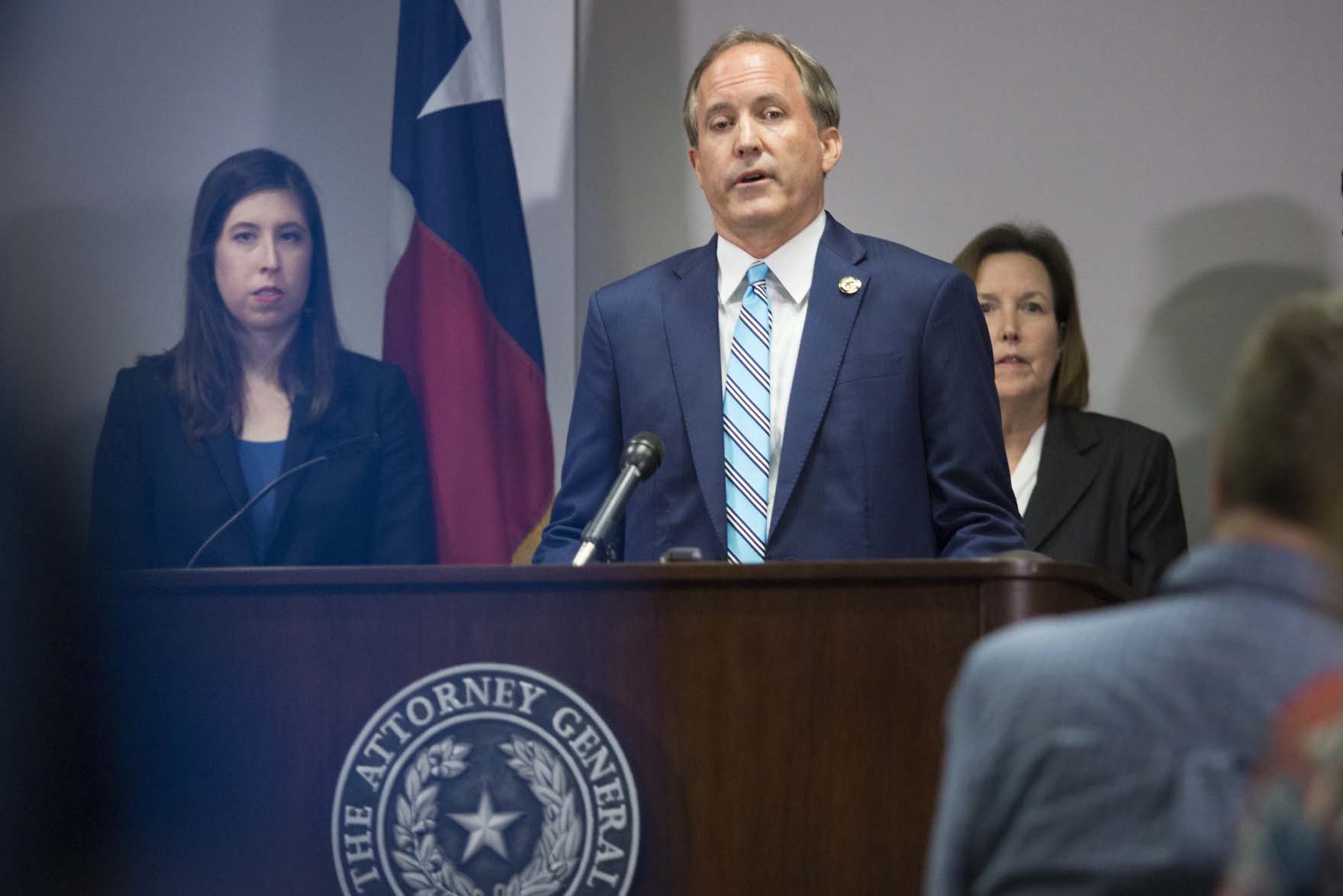It may be Memorial Day weekend, but it’s certainly not a slow day on the news front. On Saturday, the Texas House of Representatives did something it has never done before: impeached an attorney general.
Ken Paxton was first elected to office in 2014, replacing Greg Abbott, who would go on to be elected governor that same year. A fellow Republican, Paxton has been dogged by allegations and investigations for years. Despite a heavy cloud of alleged lawbreaking, he managed to avoid any final adjudication – until now.
Paxton has been suspended as attorney general while he awaits a trial in the Senate. Sergio Martínez-Beltrán, who covers state politics for the Texas Newsroom, and Brandon Rottinghaus, a political science professor at the University of Houston, joined the Standard to unpack Paxton’s impeachment and what it means for Texas politics.
This transcript has been lightly edited for clarity:
Texas Standard: Impeachment in the Texas House is, as both of you know, not a common occurrence. Professor Rottinghaus, can you give us some context on the historical significance of this event and how it stacks up to past impeachment cases in Texas?
Brandon Rottinghaus: Yeah, highlight the “historical,” because this is a rare event. This generally happens when there is an overwhelming amount of evidence against a particular incumbent. I think we’re seeing that in this case.
Historically, it’s been a kind of last resort, where either the voters haven’t officially chimed in to say that they would like to see that person removed or there’s a legislative will to do so. So, in those cases, you’re seeing the movement towards impeachment. I think that the Legislature finally had enough. They didn’t want to vote for this settlement that was going to cost taxpayers money. I think just the sheer volume of it made a lot of the members cringe.
Sergio, in your article you wrote that the impeachment vote was not along party lines. Can you tell us a little bit about what got the House Committee on Investigations rolling in the first place to take these actions against Ken Paxton?
Sergio Martínez-Beltrán: Certainly. In 2020, four whistleblowers that were former employees of Ken Paxton decided to go to the FBI and report him for some alleged misdeeds involving one of his political donors. That reporting ended up in a lawsuit, and that lawsuit ended up in a $3.3 million settlement that can only be funded by the Texas Legislature.
Of course, the Legislature doesn’t want to pay for that money. Republicans there have said that it’s a big amount. They’re not ready to pay that money because of Paxton’s alleged misdeeds or wrongdoings. So, that’s what led to this investigation by a House panel that ended up finding Paxton abusing his office, committing constitutional bribery, allegedly, and also retaliating against these former employees.
When we’re talking about what he has been impeached for, it actually goes beyond that alleged wrongdoing. Sergio, is that correct?
Sergio Martínez-Beltrán: That’s correct. The 20 articles of impeachment include a lot of the issues related to this whistleblower lawsuit, but it also includes some other complaints related to securities fraud. As a reminder, Paxton was indicted in 2015 for federal securities fraud, but he is still yet to have a trial on that. Some of these articles of impeachment are related to that as well.
A lot of folks were surprised that fellow Republicans would be moving to impeach Republican Ken Paxton. What do you make of that, Professor Rottinghaus? Does that point to a split among Republicans, as has been reported by some outlets?
Brandon Rottinghaus: I think that’s probably right. It’s odd, because in scandals like this, we’re used to seeing partisans protect fellow partisans, and we saw several of the Republicans abandon the attorney general.
It’s also interesting because we’re used to seeing the Legislature do very little about these kinds of matters. That’s why impeachment is so rare. So, there’s a kind of institutional change. For instance, in the early 1970s, during the Sharpstown scandal, the Legislature did very little. In fact, they fought against any kind of hearing to be able to investigate people who may have done wrong.
As you said, there are some of these members who are going to be potentially facing this question in a primary: Briscoe Cain, Ellen Troxclair. A fairly high number of even very conservative Republicans voted in favor of impeachment. Why they did so is sort of open. I think there is such an overwhelming amount of evidence against Attorney General Paxton that it just became an obvious ‘yes’ vote. Even people who defended the attorney general suggested that the kind of things that were being alleged were very serious and had to be investigated.
It’s one thing to get impeached by the House, which has more of a moderate reputation among Republicans. But in the Senate, things may turn out differently, because apparently Paxton has more support on that side. In fact, Paxton’s wife is a senator. There’s been some question about whether she can actually participate here. What do you know about that element, Sergio? What are people talking about when it comes to the trial side of this?
Sergio Martínez-Beltrán: I’ve been talking to folks in the Capitol, and they are already trying to do the math. Assuming that all Democrats were to vote to convict after they are presented with the evidence, they would need about eight to nine Republicans to actually convict, because in the Senate, you need two-thirds vote.
We also know, thanks to reporting by the Dallas Morning News, that Paxton’s office has turned their attention to the Texas Senate. They even presented senators with a thick packet of his defense, pretty much rebutting all the evidence that the House presented in advance of a potential trial. The Dallas Morning News reported that some Republican senators don’t even want to look at it because they truly want to be impartial and try to see the evidence presented and then make a decision.
Like you mentioned, Senator Angela Paxton will be required to be in attendance under the Constitution. We don’t know if she’ll recuse herself, but certainly she has relationships with fellow members there. It’s an uncomfortable position for her, but also for her colleagues that will have to decide the fate of her husband in the next few weeks.
Professor Rottinghaus, what is your sense of how this may play out? Looking at past impeachment efforts at the Texas Capitol, is there anything that gives us a sense of how this is going to unfold and the impact of outside political forces? Or the fact that you have a lot of Republicans making determinations about a fellow Republican?
Brandon Rottinghaus: Yeah, that’s a great point. This is definitely a national story, in part because after Donald Trump was elected, there is this sort of sense that anything goes in politics, and politicians can wiggle their way out of scandals. And Ken Paxton certainly has been doing that. So, I do think that there’s this sort of appetite to understand why.
I do think we’re going to see the trial presented fairly in the Senate, and that’s what we need. That’s the whole point of this separation of powers, where impeachment is a process where the branches are able to check themselves in each other. This is supposed to be a very somber process, and I trust that they’ll move in that direction.
In terms of the actual process, the Senate has pretty much carte blanche to do as they want. The Supreme Court in the past has basically given the Senate the ability to be able to structure this as they wish. They’ll probably follow a similar model to what they did in 1975 for the impeachment of a state judge. I think they’ll probably also take bits and pieces from what the federal government has done in the last couple of impeachments, which have happened more frequently than one might imagine.
The biggest wildcard here is whether Ken Paxton presents evidence in his own defense. Personally, this is interesting because Jim Ferguson, when he was governor and he was being impeached, was the key witness and did the closing statement. So, I’m wondering how much we’ll see Ken Paxton actually in the chamber making a case for himself.
With Ken Paxton on the sidelines, who takes his position? Do you have any sense of that, Sergio?
Sergio Martínez-Beltrán: Yes. Brent Webster, who has served as Paxton’s first assistant attorney general, has taken over the role temporarily. Webster sent a memo to the staff of the Office of the Attorney General, and he suggested that he’ll follow Paxton’s approach to leading the office. The Texas Tribune obtained the memo, and they report that Webster said in that memo that, “the state of Texas has had no better elected official than Ken Paxton,” when it comes to “defending citizen’s rights, fighting for justice and preserving freedom,” and that he’ll continue to do the same.
Now, we still don’t know for how long Webster will be in that position. Governor Abbott could name a replacement. But what we know is Paxton will not be able to resume his duties as attorney general until the Senate finalizes a trial.












